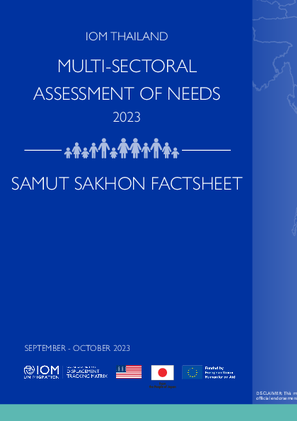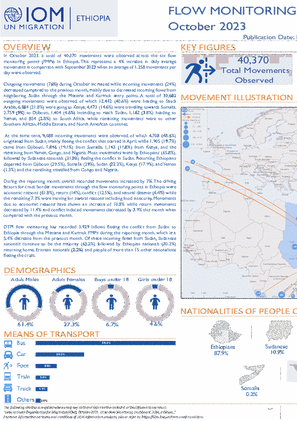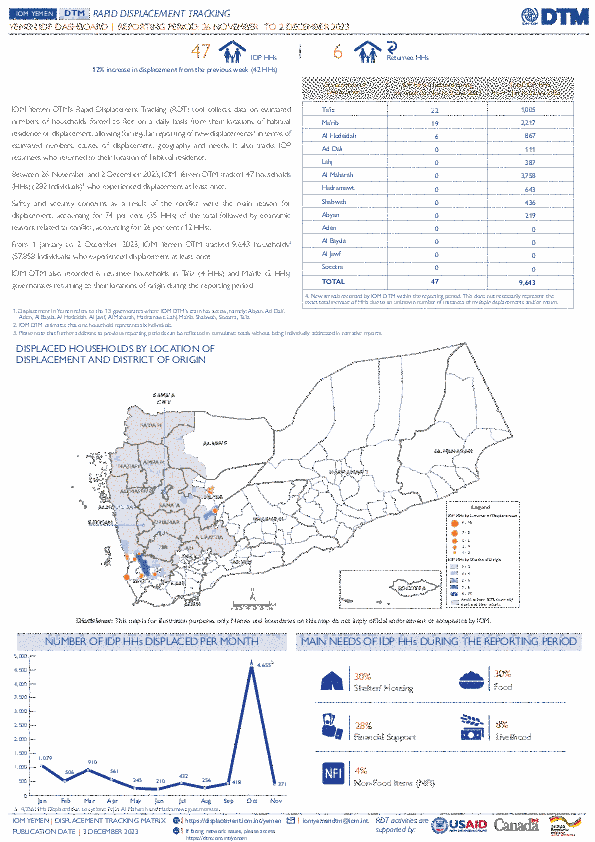-
Countries
-
Data and Analysis
-
Special Focus
-
Crisis Responses

Contact
DTMThailand@iom.int
Language
English
Location
Thailand
Period Covered
Sep 30 2023
Oct 23 2023
Activity
- Survey
- Site Assessment
This factsheet aims to provide a snapshot of multi-sectoral conditions, needs, and challenges among Myanmar migrants in Samut Sakhon province as captured between September and October 2023 by IOM Thailand’s multisectoral assessment of needs. The purpose of this assessment is to provide insights regarding the severity of needs among migrant populations, identify vulnerable population groups and geographic areas with the most acute needs, inform assistance planning and relevant Sustainable Development Goals (SDGs) targets, and provide sectoral and inter-sectoral baselines for future assessments.

Contact
DTM Ethiopia, DTMEthiopia@iom.int
Language
English
Location
Ethiopia
Period Covered
Oct 01 2023
Oct 31 2023
Activity
- Flow Monitoring
In October 2023, a total of 40,370 movements were observed across the six flow monitoring points (FMPs) in Ethiopia. This represents a 4% increase in daily average movements in comparison with September 2023 when an average of 1,258 movements per day were observed.
Outgoing movements (76%) during October increased while incoming movements (24%) decreased compared to the previous month, mainly due to decreased incoming flows from neighboring Sudan through the Metema and Kurmuk entry points. A total of 30,682 outgoing movements were observed, of which 12,442 (40.6%) were heading to Saudi Arabia, 6,684 (21.8%) were going to Kenya, 4,473 (14.6%) were travelling towards Somalia, 2,759 (9%) to Djibouti, 1,404 (4.6%) intending to reach Sudan, 1,162 (3.8%) heading to Yemen, and 854 (2.8%) to South Africa, while remaining movements were to other Southern African, Middle Eastern, and North American countries.
At the same time, 9,688 incoming movements were observed, of which 4,708 (48.6%) originated from Sudan, mainly fleeing the conflict that started in April, while 1,905 (19.7%) came from Djibouti, 1,846 (19.1%) from Somalia, 1,143 (11.8%) from Kenya, and the remaining from Yemen, Congo, and Nigeria.
Contact
DTM Yemen, iomyemendtm@iom.int
Location
Yemen
Activity
- Mobility Tracking
- Event Tracking
Period Covered
Nov 26 2023 -Dec 02 2023
From 1 January to 2 December 2023, IOM Yemen DTM tracked 9,643 households (HH) (57,858 Individuals) who experienced displacement at least once.
Between 26 November and 2 December 2023, IOM Yemen DTM tracked 47 households (282 individuals) displaced at least once. The majority of people moved into/within the following governorates and districts:
Al Hodeidah (14 HHs) – At Tuhayta (3 HHs), Hays (3 HHs), Al Hawak (3 HHs) districts.
Ta’iz (11 HHs) – Maqbanah (8 HHs), Al Maafer (3 HHs) districts.
Ma’rib (5 HHs) – Harib (5 HHs) district.
- Ta’iz (22 HHs) – Al Makha (12 HHs), Mawza (6 HHs), Al Maafer (4 HHs) districts. Most displacements in the governorate originated from Taiz and Al Hodeidah.
- Ma’rib (19 HHs) – Marib (9 HHs), Marib City (5 HHs), Harib (5 HHs) districts. Most displacements in the governorate originated from Taiz and Al Hodeidah.
- Al Hodeidah (6 HHs) – Al Khukhah (5 HHs), Hays (1 HHs) districts. Most displacements in the governorate were internal.
Population Groups
Survey Methodology
Unit of Analysis Or Observation
Type of Survey or Assessment
Keywords
Geographical Scope
Administrative boundaries with available data
The current dataset covers the following administrative boundaries

Contact
DTM Yemen, iomyemendtm@iom.int
Language
English
Location
Yemen
Period Covered
Nov 26 2023
Dec 02 2023
Activity
- Event Tracking
IOM Yemen DTM’s Rapid Displacement Tracking (RDT) tool collects data on estimated numbers of households forced to flee on a daily basis from their locations of origin or displacement, allowing for regular reporting of new displacements in terms of estimated numbers, geography, and needs. It also tracks returnees who returned to their location of origin.
From 1 January to 2 December 2023, IOM Yemen DTM tracked 9,643 households (HH) (57,858 Individuals) who experienced displacement at least once.
Between 26 November and 2 December 2023, IOM Yemen DTM tracked 47 households (282 individuals) displaced at least once. The majority of people moved into/within the following governorates and districts:
- Ta’iz (22 HHs) – Al Makha (12 HHs), Mawza (6 HHs), Al Maafer (4 HHs) districts. Most displacements in the governorate originated from Taiz and Al Hodeidah.
- Ma’rib (19 HHs) – Marib (9 HHs), Marib City (5 HHs), Harib (5 HHs) districts. Most displacements in the governorate originated from Taiz and Al Hodeidah.
- Al Hodeidah (6 HHs) – Al Khukhah (5 HHs), Hays (1 HHs) districts. Most displacements in the governorate were internal.
The majority of people moved from the following governorates and districts:
- Al Hodeidah (14 HHs) – At Tuhayta (3 HHs), Hays (3 HHs), Al Hawak (3 HHs) districts.
- Ta’iz (11 HHs) – Maqbanah (8 HHs), Al Maafer (3 HHs) districts.
- Ma’rib (5 HHs) – Harib (5 HHs) district.

Contact
DTM Somalia, IOMSomaliaDTM@iom.int
Language
English
Location
Somalia
Period Covered
Nov 19 2023
Nov 25 2023
Activity
- Mobility Tracking
- Event Tracking
In response to the Somalia’s severe drought beginning in November 2021, DTM Somalia launched an Emergency Trends Tracking (ETT) tool first in Gedo and Bay regions in 2022, and subsequently in Hiraan, Banadir and Middle Shabelle regions in 2023 to monitor drought related displacement trends and hotspots in support of operational planning. However, during the first half of 2023, conflict and flooding displacements have been significant. Therefore, DTM restructured its ETT tool to capture multi-shock displacements (drought, flood, conflict and other) from October 2023.
ETT is a crisis-based tool that tracks sudden displacement triggered by specific events or emerging crises. The objective of ETT is to help prioritize humanitarian response and to enable partners to deliver rapid assistance.
Contact
DTM Mozambique, DTMMozambique@iom.int
Location
Mozambique
Activity
- Mobility Tracking
- Site Assessment
Period Covered
Jul 12 2023 -Aug 04 2023
A site assessment is a sub-component of mobility tracking. It aims to collect data on population presence, living conditions and needs in a particular displacement site or community.
Population Groups
IDPs
Survey Methodology
Unit of Analysis Or Observation
Site
Type of Survey or Assessment
Key Informant
Keywords
Geographical Scope Partial Coverage
Administrative boundaries with available data
The current dataset covers the following administrative boundaries

Contact
DTM Europe, DTMMediterranean@iom.int
Language
English
Location
Hungary
Period Covered
Jul 01 2023
Sep 30 2023
Activity
- Survey
- Return Intention
Key Findings:
- Top 3 countries of stay: Hungary (63%), Germany (12%), Austria (5%).
- Top oblasts of origin: Kyiv (24%), Zakarpatska (18%), Dnipropetrovska (14%).
- Destinations in Ukraine: returning to oblast of origin (85%), returning to a different oblast (14%). Among those intending to return to a different oblast, top intended destinations included: Zakarpatska (68%), Kyiv city (21%), and Lvivska (6.5%).
- Most frequent mode of transport: train (86%).
- Intentions upon crossing back: long-term stay (over 30 days) - 23%, short-term visit (60%), does not know (17%).
- Top needs upon crossing back*: financial support (39%), accommodation (39%), transport (35%).
- Top areas of assistance received*: transport (67%), accommodation (46%), food (37%).
Contact
dtmlebanon@iom.int
Location
Lebanon
Activity
- Mobility Tracking
- Baseline Assessment
Period Covered
Oct 10 2023 -Nov 28 2023
Since October 8 there has been an increase in cross-border incidents between Israel and Lebanon, resulting in the displacement of people both within the South and elsewhere within the country. Since October 10, the Displacement Tracking Matrix (DTM) has been conducting the daily monitoring of population movements. The objective of the exercise is to inform preparedness and response planning.
Aggregated data is available through the DTM API: https://dtm.iom.int/data-and-analysis/dtm-api
A more detailed version of this dataset is available, to get access kindly click on the 'Request Access' button
Population Groups
IDPs
Survey Methodology
Unit of Analysis Or Observation
Admin Area 2
Admin Area 3
Household
Individual
Type of Survey or Assessment
Key Informant
Keywords
Geographical Scope Full Coverage
Administrative boundaries with available data
The current dataset covers the following administrative boundaries
Contact
dtmlebanon@iom.int
Location
Lebanon
Activity
- Mobility Tracking
- Baseline Assessment
Period Covered
Oct 10 2023 -Nov 02 2023
Since October 8 there has been an increase in cross-border incidents between Israel and Lebanon, resulting in the displacement of people both within the South and elsewhere within the country. Since October 10, the Displacement Tracking Matrix (DTM) has been conducting the daily monitoring of population movements. The objective of the exercise is to inform preparedness and response planning.
Aggregated data is available through the DTM API: https://dtm.iom.int/data-and-analysis/dtm-api
A more detailed version of this dataset is available, to get access kindly click on the 'Request Access' button
Population Groups
IDPs
Survey Methodology
Unit of Analysis Or Observation
Admin Area 2
Admin Area 3
Type of Survey or Assessment
Key Informant
Keywords
Geographical Scope Full Coverage
Administrative boundaries with available data
The current dataset covers the following administrative boundaries
Contact
dtmlebanon@iom.int
Location
Lebanon
Activity
- Mobility Tracking
- Baseline Assessment
Period Covered
Oct 10 2023 -Oct 27 2023
Since October 8 there has been an increase in cross-border incidents between Israel and Lebanon, resulting in the displacement of people both within the South and elsewhere within the country. Since October 10, the Displacement Tracking Matrix (DTM) has been conducting the daily monitoring of population movements. The objective of the exercise is to inform preparedness and response planning.
Aggregated data is available through the DTM API: https://dtm.iom.int/data-and-analysis/dtm-api
A more detailed version of this dataset is available, to get access kindly click on the 'Request Access' button
Population Groups
IDPs
Survey Methodology
Unit of Analysis Or Observation
Admin Area 2
Admin Area 3
Type of Survey or Assessment
Key Informant
Keywords
Geographical Scope Full Coverage
Administrative boundaries with available data
The current dataset covers the following administrative boundaries
